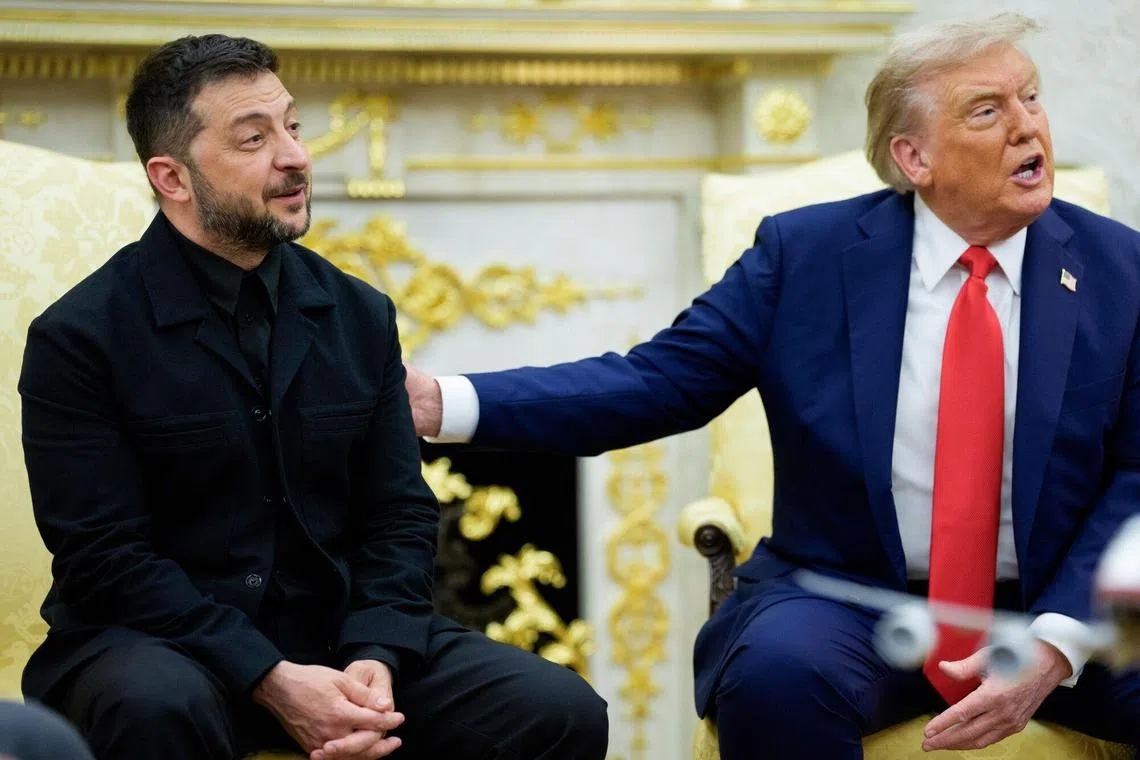Can Zelensky trust Trump? Ukraine’s fate may depend on the answer
Sign up now: Get ST's newsletters delivered to your inbox

Ukainian President Volodymyr Zelensky and US President Donald Trump during a meeting in the Oval Office of the White House in Washington, on Aug 18.
PHOTO: BLOOMBERG
WASHINGTON – For President Volodymyr Zelensky of Ukraine, a lot is riding on how much he can trust US President Donald Trump.
Mr Trump offered only vague assurances on Aug 18 that the US would play a role in guaranteeing Ukraine’s safety
“We’re going to make sure it works,” Mr Trump said at the start of an hour-long meeting with Mr Zelensky and a delegation of European leaders at the White House. “And I think if we can get to peace, it’s going to work. I have no doubt about it.”
The meeting ended with upbeat assessments by the Europeans and some progress towards a meeting between Mr Zelensky and Mr Putin, at a site to be determined.
But the question of whether Mr Trump can be trusted to keep his word speaks to his history of ever-changing positions and mercurial feelings about Ukraine and other diplomatic crises, especially when it comes to high-stakes negotiations.
It is a lot for a wartime leader like Mr Zelensky to bet on, especially with his country 3½ years into a war instigated by Russia
“They’re not just interested in any such assurances. They’re not interested in President Trump saying, ‘You can count on me’,” said Mr William Taylor Jr, a former US ambassador to Ukraine. “They’re not going to agree or accept an assurance, a political assurance. That doesn’t give them the security they need.”
After the meeting on Aug 18, Mr Zelensky said the discussion about security guarantees called for Ukraine to buy US$90 billion (S$115 billion) of American weapons through Europe and for the US to buy drones from Ukraine.
He said that a formal agreement still needed to be made.
Still, Mr Trump’s talk of security guarantees was a shift from his earlier position that the protection of Ukraine should be left solely to those in Europe.
That was far from the only flip-flop.
Just days ago, Mr Trump threatened “severe consequences” if Mr Putin did not agree to a swift ceasefire, which Ukraine has demanded before any negotiations over a permanent peace begin.
He changed course after meeting Mr Putin on Aug 15 in Alaska
Mr Trump then turned his pressure campaign to Mr Zelensky, saying over the weekend that the Ukrainian leader could end the war with Russia “almost immediately, if he wants to, or he can continue the fight”.
Mr Trump’s aides have cast both his Alaska summit with Mr Putin and his meetings at the White House on Aug 18 as critical steps towards peace.
The European leaders commended Mr Trump’s efforts to get Mr Putin and Mr Zelensky to the negotiating table, even if any potential peace proposal has been absent critical details.
“I’m really excited,” Mr Mark Rutte, the secretary-general of Nato, told Mr Trump during a televised portion of the meeting. “The fact that you have said I’m willing to participate in security guarantees is a big step. It’s really a breakthrough.”
But there was little clarity on how involved the US would be in such a plan.
Mr Daniel Fried, a former US ambassador to Poland, said one option that would probably win the backing of Ukrainians was if European nations agreed to provide military assets inside Ukraine in the case of a future attack, while Mr Trump agreed to back them up with defence assets stationed in neighbouring countries.
“I don’t think Zelensky will stop with a simple verbal assurance from the president,” Mr Fried said. “If Zelensky, you say to Trump that what you said is important and great and then you find out what the mechanisms are.”
Beyond the war in Ukraine, Mr Trump has given world leaders reason to doubt his assurances.
He threatened to bring hell to Hamas if all hostages held by the terrorist group in the Gaza Strip were not released.
He has, however, distanced himself from the human catastrophe in Gaza in recent weeks.
He has made repeated threats on tariffs throughout his time in office, only to back off at the last minute on multiple occasions.
He once floated the idea of forcibly displacing Palestinians in Gaza, only to back away from the idea when he faced pushback from Arab nations
He has also repeatedly shifted his approach to Mr Putin, at times saying he can work with the Russian leader to secure peace and at other times threatening him with sweeping economic penalties.
In a moment of candour on Aug 18, Mr Trump acknowledged that the war in Ukraine – which he once promised to end in 24 hours – was more challenging than he had once anticipated.
“I thought this was going to be one of the easier ones,” Mr Trump said as he described his administration’s work trying to end global conflicts. “It’s actually one of the most difficult and very complex.” NYTIMES


